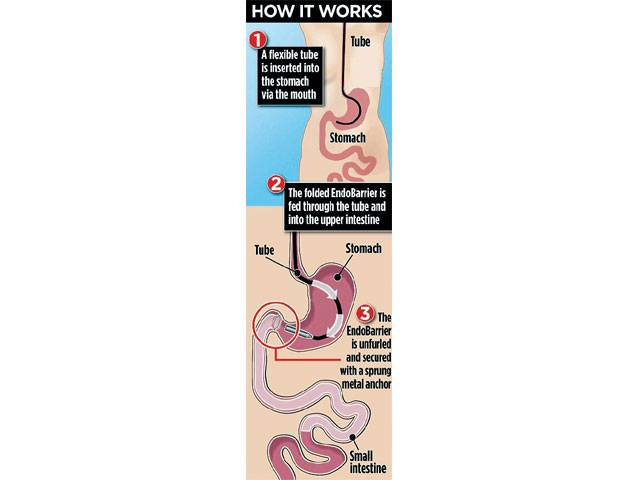LONDON DM - It is often a last resort for those desperate to combat their obesity. Yet doctors are increasingly seeing weight-loss surgery as a way to fight the type 2 diabetes epidemic that has seen the number of British sufferers spiral to more than three million.
It costs the NHS over £9billion a year to treat the disease, which is usually triggered by obesity. Yet 86 per cent of type 2 diabetes patients who have weight-loss surgery - including gastric bands and bypasses - are in remission from the condition two years later.
The newest option is the gastric sleeve which has many of the benefits of the more invasive bypass. This involved removing parts of the digestive system, with fewer risks.
Jenny Clarke, 50, from Derbyshire, had a gastric sleeve - known as an EndoBarrier - fitted in September 2011. The 40-minute procedure, carried out under general anaesthetic, involves a tube being inserted into the mouth and threaded into the stomach and then into the upper intestine.
Once in place, the EndoBarrier - a very thin plastic sheath, similar to sausage-skin - is unfurled and secured with a sprung metal anchor.
It lines the first 2ft of the small intestine, causing food to be absorbed further down the intestine.
Weight loss is one result, but it also inhibits the release of hormones by the gut.
This has a dramatic effect on the function of the pancreas, which regulates production of insulin, the key hormone in diabetes.
Jenny developed the illness after a car accident in 2003. ‘I couldn’t walk for eight months and was in constant pain. Even though I didn’t eat much, I barely moved. Within five years I went from 9½st to 20st.’
The crash had triggered the condition fibromyalgia which causes chronic pain all over the body, and exhaustion. Despite numerous blood tests, doctors failed to spot Jenny’s blood sugar reaching alarmingly high levels.
Type 2 diabetes occurs when the body loses the ability to process sugar, with large amounts remaining in the blood which can damage the organs and blood vessels, raising the risk of stroke and heart conditions.
Jenny says: ‘My GP ordered test after test which he said showed nothing. My blood sugar was around 19 for two years - about four times above the recommended level.
Tuesday, April 16, 2024
Sausage-skin implant that can reverse diabetes

Pakistan, IMF discussing new multi-billion-dollar program, says Finance Minister Aurangzeb
11:09 AM | April 16, 2024
LESCO ‘bars’ officers from appearing before FIA in overbilling probe
10:49 AM | April 16, 2024
Aleem Khan, Kamran Tessori discuss matters of mutual interests
10:40 AM | April 16, 2024
Global brands facing challenge from local contenders in Pakistan's FMCG market
10:24 AM | April 16, 2024
Israeli Air Force finalizes preparations for possible attack on Iran
8:21 AM | April 16, 2024
Political Reconciliation
April 16, 2024
Pricing Pressures
April 16, 2024
Western Hypocrisy
April 16, 2024
Policing Reforms
April 15, 2024
Storm Safety
April 15, 2024
Democratic harmony
April 16, 2024
Digital dilemma
April 16, 2024
Classroom crisis
April 16, 2024
Bridging gaps
April 16, 2024
Suicide awareness
April 15, 2024
ePaper - Nawaiwaqt
Advertisement
Nawaiwaqt Group | Copyright © 2024





